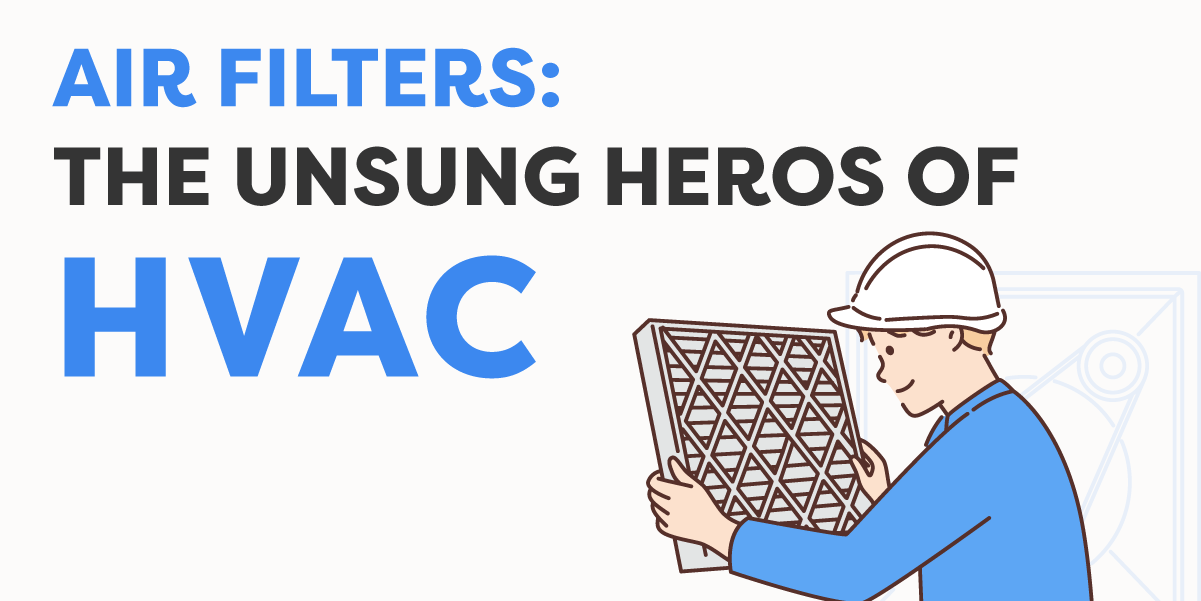When it comes to HVAC (Heating, Ventilation, and Air Conditioning) systems, one component goes unnoticed but plays a crucial role in maintaining indoor air quality and system efficiency. Air filters work silently to trap pollutants, allergens, and contaminants, ensuring that the air we breathe is clean and healthy. In this blog, we’ll explore the importance of air filters and their benefits and types. We’ll offer maintenance tips and answer frequently asked questions to shed light on the part they play in HVAC systems.
What Air Filters Do
Air filters act as the first line of defense against airborne particles and pollutants that circulate within our homes or commercial spaces. They’re designed to capture dust, pollen, pet dander, mold spores, bacteria, and other contaminants, preventing them from entering the HVAC system and being recirculated. By trapping these harmful particles, air filters make indoor environments safer and healthier.
How Air Filters Work
Air filters use a fibrous or pleated material to create a barrier against particles. As air passes through the filter, the fibers or pleats trap the particles, allowing only clean air to continue into the HVAC system. The efficiency of an air filter is measured by its MERV (Minimum Efficiency Reporting Value) rating, which indicates its ability to remove particles of different sizes. Higher MERV ratings mean greater filtration efficiency.
The Benefits of Air Filters
1. Improved Indoor Air Quality
Good indoor air quality is critical for people with respiratory conditions, allergies, or asthma. Even for people without breathing problems, clean air promotes overall well-being.
2. Enhanced HVAC System Efficiency
Air filters help keep HVAC systems clean and prevent the buildup of dirt and debris on components like the coils and blower motor. A clean system operates more efficiently, consuming less energy and reducing utility costs.
3. Extended Equipment Lifespan
Clean air filters prevent dirt accumulation within the HVAC system. This reduces strain on the equipment, leading to fewer breakdowns and an extended lifespan.
4. Cost Savings
With improved system efficiency and reduced energy consumption, homeowners and businesses can lower utility bills and prevent damage to HVAC equipment.
Types of Air Filters
Cheap air filters are better than nothing but don’t provide the same protection as higher-quality models. Here are the most common types of air filters, from least to most effective:
1. Fiberglass Filters
Fiberglass filters trap large particles but are too porous to be effective against smaller ones. They should be replaced every 30 days and have a MERV rating between 1 and 4.
2. Pleated Filters
Pleated filters capture a wider range of particles and have a MERV rating between 5 and 13. They should be replaced every 3 months or as needed, depending on the home’s environment.
3. High-Efficiency Particulate Air (HEPA) Filters
HEPA filters have a MERV rating of 17 to 20. They’re designed to capture up to 99.97% of particles as small as 0.3 microns and should be replaced every 12 months or as needed.
4. Washable Filters
Washable filters offer a sustainable alternative to disposable filters. They’re typically made of aluminum or foam and can be cleaned with water or a mild detergent.
5. Electrostatic Filters
Electrostatic filters use an electrical charge to attract and capture larger particles. They can be disposable or washable. Some electrostatic filters are also treated with an antimicrobial agent to inhibit the growth of bacteria and mold.
Maintaining Air Filters for Optimal Performance
- Regular Inspection: Check the air filters at least once a month. If they look dirty or clogged, it’s time for cleaning or replacement.
- Scheduled Replacement: Follow the manufacturer’s guidelines for filter replacement. Disposable filters typically need replacement every three months, while washable filters require cleaning every 1-3 months.
- Proper Installation: Make sure the filter fits securely within the filter slot. An improperly installed filter can allow air to bypass the filtration system.
- Cleaning Washable Filters: Gently rinse washable filters with water or a mild detergent. Avoid using harsh chemicals or excessive force, as it can damage the filter’s fibers. Allow the filter to dry completely before reinstalling it.
- Professional Maintenance: Consider scheduling professional HVAC maintenance at least once a year. HVAC technicians can inspect, clean, and optimize the entire system, including the air filters.

